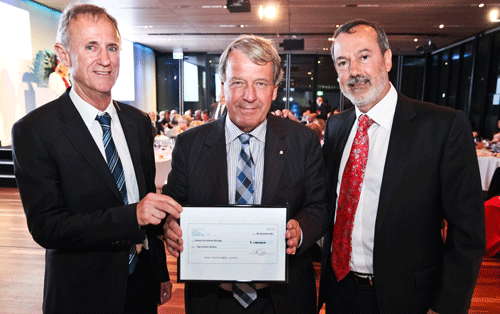 The Centre for Cancer Biology (CCB) has been awarded $2 million funding from the Australian Cancer Research Foundation (ACRF) to establish the world-class ACRF Cancer Discovery Accelerator facility in Adelaide. The grant was presented at the ACRF awards dinner in Sydney last night.
The Centre for Cancer Biology (CCB) has been awarded $2 million funding from the Australian Cancer Research Foundation (ACRF) to establish the world-class ACRF Cancer Discovery Accelerator facility in Adelaide. The grant was presented at the ACRF awards dinner in Sydney last night.

The new facility will house cutting-edge technologies currently unavailable in Australia, and will greatly expand the research expertise and capabilities in South Australia and across the continent.
The new technologies include the latest genome sequencing equipment and a super high resolution microscope, enabling researchers to develop powerful new methods for measuring proteins in individual cancer cells. The availability of the technologies within a single integrated facility will enhance technology uptake and ensure optimal application of these methodologies for the ultimate benefit of the end users – cancer patients.
CCB Co-Director Professor Angel Lopez says the ACRF Cancer Discovery Accelerator will be housed in Adelaide University's new Health Innovation Building currently being constructed on North Terrace.
“We’re delighted to receive this funding from the ACRF which enables us to bring outstanding technology into South Australia to facilitate innovation and continue to be at the forefront of
“The advanced technologies of the ACRF Cancer Discovery Accelerator will underpin core research streams at the CCB aimed at significantly enhancing our understanding of the causes of cancer and translating these findings into improving outcomes for patients with cancer.”
ACRF Chief Executive, Professor Ian Brown, says the ACRF is pleased to provide a single integrated facility that will enhance technology uptake in cancer research for the ultimate
“The CCB is conducting breakthrough research capitalising on genomics and various experimental models, which is fueling the discovery of genes proteins and regulatory RNAs
“Converting these discoveries into actionable targets for drugs is the goal of the project. The ACRF Cancer Discovery Accelerator will provide access to new methodologies for uncovering molecular mechanisms relevant to cancer and it will facilitate the transition of these discoveries into treatments that will benefit patients with all types of cancer. ”



